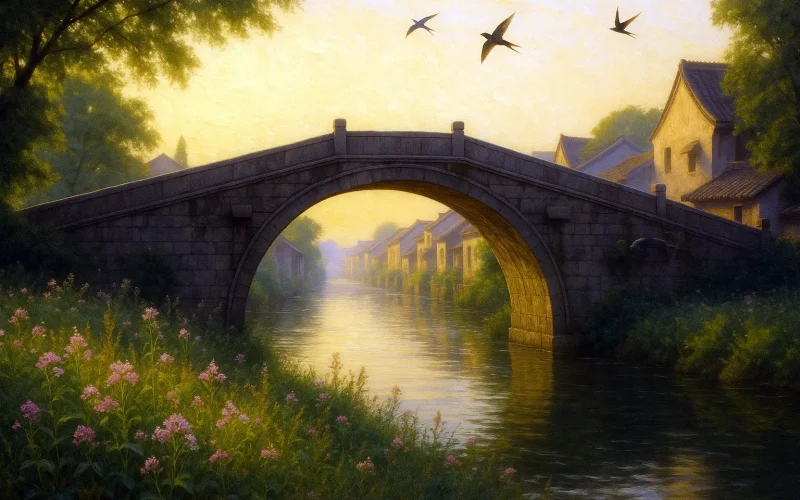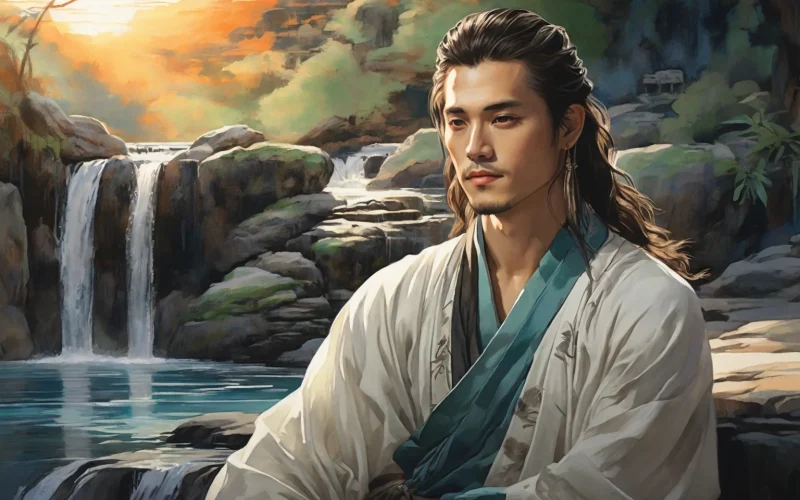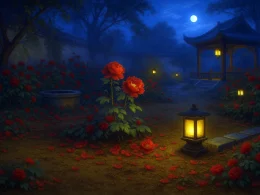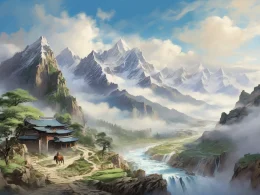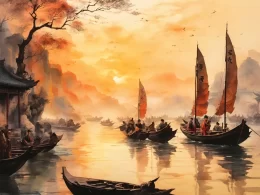Grass has run wild now by the Bridge of Red-Birds;
And swallows' wings, at sunset, in Blacktail Row
Where once they visited great homes,
Dip among doorways of the poor.
Original Poem
「乌衣巷」
刘禹锡
朱雀桥边野草花, 乌衣巷口夕阳斜。
旧时王谢堂前燕, 飞入寻常百姓家。
Interpretation
Composed in 826 AD during the Baoli era of Emperor Jingzong's reign, this poem is part of the "Five Poems of Jinling" series and stands as one of Liu Yuxi's most celebrated historical meditations. Having been exiled to the Jiangnan region for an extended period, the poet contemplates the ancient capital Jinling (present-day Nanjing) with profound emotion, contrasting its former splendor with current desolation. Through concise yet evocative imagery, Liu projects his feelings onto the landscape, using scenes of past glory and present decline to express the impermanence of life and vicissitudes of time, imbuing the work with rich historical resonance and philosophical depth.
First Couplet: 朱雀桥边野草花,乌衣巷口夕阳斜。
Zhūquè qiáo biān yě cǎo huā, Wūyī xiàng kǒu xīyáng xié.
Grass has run wild now by the Bridge of Red-Birds; / And swallows' wings, at sunset, in Blacktail Row
The Vermilion Bridge and Black-Gown Lane were once frequented by the elite Wang and Xie families. Now overgrown with weeds and bathed in melancholy twilight, these sites poignantly symbolize the passage of time and the transience of human glory.
Second Couplet: 旧时王谢堂前燕,飞入寻常百姓家。
Jiù shí Wáng Xiè táng qián yàn, fēi rù xúncháng bǎixìng jiā.
Where once they visited great homes, / Dip among doorways of the poor.
The swallows serve as winged witnesses to history, their unchanged migratory patterns contrasting sharply with the dramatic social transformations below. Their shift from aristocratic mansions to humble homes powerfully encapsulates the cyclical nature of rise and fall.
Holistic Appreciation
With remarkable economy of language, the poem paints a vivid portrait of Jinling's decline. Beginning with precise visual details - wildflowers by the bridge, slanting sunlight over the lane - it culminates in the brilliant image of swallows bridging past and present. The poet avoids direct lamentation, instead letting these carefully chosen elements construct a powerful meditation on historical change. The apparent simplicity of "wild grasses" and "commoners' homes" belies profound philosophical depth, inviting readers to contemplate the ephemeral nature of power and prestige.
Artistic Merits
- Minimalist Magnification: Tiny details (wildflowers, a single lane) telescope into grand historical narratives
- Avian Chronology: Swallows' unchanged habits serve as nature's timekeepers against human transience
- Luminous Restraint: "Setting sun hangs low" conveys more through measured phrasing than elaborate description
- Democratic Vision: The focus on "commoners' homes" subtly elevates enduring folk life over ephemeral aristocratic power
Insights
This Tang masterpiece transcends its specific historical context to offer timeless wisdom: all earthly glory proves transient, while the rhythms of ordinary life persist. The swallows - returning annually despite political upheavals - symbolize nature's impartial witness to human vanity. In our era of rapid change, Liu's meditation reminds us that true permanence lies not in power structures but in life's fundamental continuities. The poem ultimately celebrates resilience - how common people, unlike the mighty Wangs and Xies, adapt and endure across generations.
Poem translator
Kiang Kanghu
About the poet

Liu Yuxi(刘禹锡), 772 - 842 AD, was a native of Hebei. He was a progressive statesman and thinker in the middle of the Tang Dynasty, and a poet with unique achievements in this period. In his compositions, there is no lack of poems reflecting current affairs and the plight of the people.





